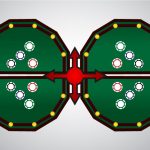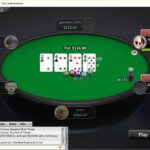The most repeated advice in poker. We’ve all heard it before.
Position, Position, Position.
The proof is in the pudding. Our statistics show that we win much more money on the button than we do UTG. But the advice to play in position is not very powerful when we have no idea why. That’s why, in this weeks article, I’m going to explain why we pound position and how we can apply it to our games.
The main reason is the fundamental difference between being out of position and in position. When we are in position we actually get one more street of information than when we are out of position. Let’s examine a common scenario, where one player, player A, raises in position and gets a caller in the blinds from another player, player B. Player B is ostensibly first to act on the flop. Player B can only act the information from the previous street (what our opponent did preflop and what we did preflop). However, look at what information player A has. He can act on not only what him and his opponent did preflop, but also their flop action. Now look at what information B’s first action has on the turn. He can only act on the exact same information player A had on the flop! Player A actually has a full betting round of information more than our opponent. Considering there are only 4 betting rounds in poker, that information is huge.
Another reason is pot control… Let’s we raise preflop in position and and get called from the blinds. The flop comes 952, two spades. Because some opponents will c/r this flop liberally, we choose to check behind a hand like Ace high, or K2s, maybe even 65. Now even if our opponent chooses to make a pot sized bet on the turn and river versus our extremely weak range, he can only get about 1/3rd of our stack in the pot. If he wants to get our whole stack in the pot, he’d have to overbet the flop, a move that we could easily exploit by checking behind a set or a nut hand on occasion. Out of position we have little control of the pot size, often when we want to keep the pot small with a weak hand, the only way we can do it is to check, which is often a mistake with our midpair and weak top pair hands.
One other reason is the amount of players left to act preflop. Sit and go player know this one well. Let’s say in a six max game we are dealt in UTG. We have 5 people to act behind us, each who have a 2-3% of having a super good hand. All together that adds up to around a 12% chance we are going to be facing a nut hand. Because of this, we are going to face ranges stronger than ours and will likely have to fold the hands we raise to a threebet (unless it’s a good hand!).
Because of all these factors, we can play a weaker range (aka call more hands, raise more hands, bet more hands postflop) than our opponents stronger range. Takes this scenario for instance: We raise on the button 100bb deep with 76s, and our opponent threebets us from the blinds with KTo. KTo has about 55% equity against 76s; in other words it’s a better hand. Assuming both opponents are of the exact same skill, which opponent is better off. That is to say, which opponent will win more in the long run? It’s likely the player with 76s, because of the advantages of position. This is the same concept as if we have a range in position that has 45% equity against a range out of position with 55% equity. Assuming similar skill levels, in all likelihood the player in position is going to win more money in this situation in the long run than our opponent.
That’s why position is so strong.
Find more articles by ISF, aka IowaSkinsFan, aka Danny Steinberg here.
Leave a Comment Below!
Submit your review | |









